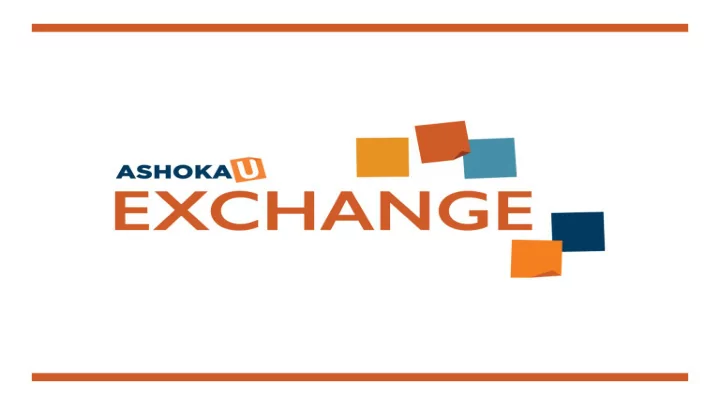

Occupation: Bridge Builder. How collaboration and breaking down campus silos can lead to greater impact
SESSION OVERVIEW Why breaking down silos and hierarchies is so important for Changemaker Campuses 1. and an “everyone a changemaker” world Your current “collaboration challenges” 2. Collaboration stories 3. Applying models to your collaboration challenges 4. Q&A 5. Your near-term and long-term action plan 6.
Multimodal Audience Participation http://bit.ly/bridge_building
Why challenge silos and hierarchies? Silos: • Real-world problems are interdisciplinary. “Innovation thrives in large networks” (S. Johnson, Where Good Ideas Come From: The • Natural History of Innovation) . Hierarchies: • Social justice work requires a foundation in equity and distributed leadership, where “everyone is a changemaker” and leads. “Everyone a changemaker” includes students, faculty, staff, alumni, community members • (and more!).
Our Cross-Campus Collaborative Team • Meredith Hein - Rollins College • Sandra LaFleur - Miami Dade College • Dr. Beverly Moore-Garcia - Miami Dade College • Patrick Odoyo - Rollins College • Kelsey Otero - Marquette University • Donna Rapaccioli - Fordham University • Cynthia Sarver – University of St. Thomas
Walking Our Talk: Educators as Changemakers Miami Dade College • Sandra LaFleur Director of Social Change Initiatives; AU Change Leader • Dr. Beverly Moore-Garcia President, Kendall Campus
• The role of our people in changemaking education is significant. • “Educating” is the responsibility of faculty, staff, and administrators. • Changemaking as “new” vs. threading through existing structures. • Quick outcomes vs. sustained, incremental changes.
The Social Innovation Collaboratory Fordham University New York, NY • Donna Rapaccioli Dean, Gabelli School of Business at Fordham University
Changemaking Network Fordham University students, faculty, administrators, alumni and community members work together to promote social innovation for the achievement of social justice, social entrepreneurship, and environmental sustainability.
The Social Innovation Collaboratory An “open -door, open- mind” laboratory in which anyone can bring a socially innovative idea to be workshopped, refined, and brought to life by a collaborative, energetic project team. Bring social innovation ideas out of the “concept” stage • • Give campus innovators a platform for ideas and a place to congregate • Draw together the strengths and resources of business and the liberal arts, working across traditional boundaries Website: fordham.edu/socialinnovation Fordham “changemaker blog” : goo.gl/UExURW
Early-Stage Outcomes • Undergraduate social innovation concentrations • Urban mobility practicum with BMW • Cookstove practicum with United Nations • Sustainable fashion practicum with United Nations • Verizon grant for high school program • Food impact-investing index • New York City Climate Action Alliance partnership
Creating a Space for Spirited Dreamers, Fearless Leaders & Game-Changers Marquette University • Kelsey Otero Associate Director of Social Innovation; Change Leader
Our ‘Modern’ Team: 3 Programs Under 1 Roof
Building New Cross-Campus Space NOW
Student led, cross-campus space, that united entrepreneurship and social innovation centers
Ongoing Collaboration: Programming
Takeaways • Determine partnerships and collaborations that can add mutual value. • Prototype! • Include others in the process outside of the core team; students make great partners. • Build out the team using the 4 H’s: Hipster, Hacker, Hustler, and Handler.
Mission-in-Action: Institutionalizing Community Engagement and Social Innovation Through Co-Location Rollins College • Meredith Hein Director of the Center for Leadership & Community • Patrick Odoyo Director of the Social Innovation Hub; Change Leader
Mission-in-Action: Institutionalizing Community Engagement and Social Innovation Through Co-Location • Developing a Deeper Understanding of the Mission, Vision, and Values of this Collaborative Work to Shape a Campus Community • Synergies Between Traditional Community Engagement Models and Social Innovation and Entrepreneurship • Building Campus and Community Support and Engagement • Creating an Ecosystem that is Centered on Student Learning Linking Their Curricular and Co-curricular Experiences
Thank you! Please complete your Commitment Card and start building bridges for a better changemaker campus ecosystem at your institution right away!
Recommend
More recommend